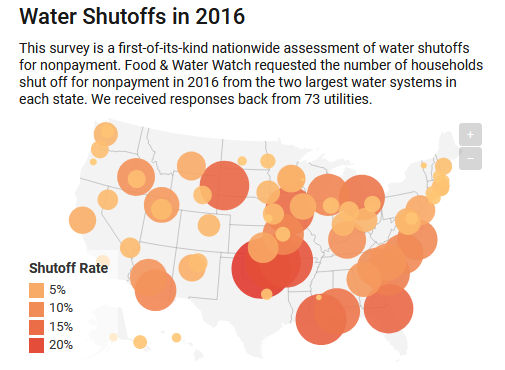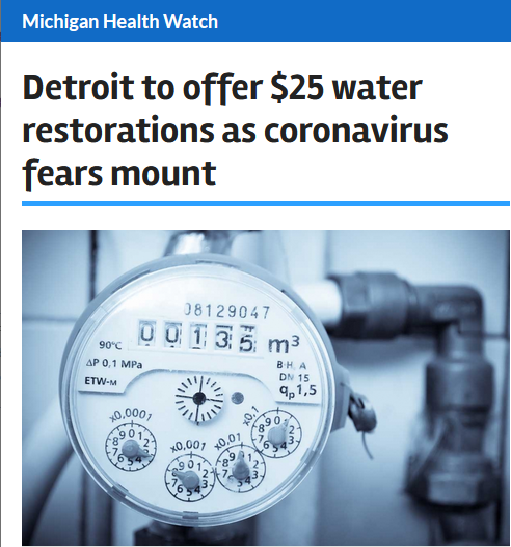Mary Grant: "The first thing that the CDC tells you to do to help prevent the spread of disease is to wash your hands. But if you don't have water at home, you can't take that simple action to protect yourself or your family or your community."
MG: Cities are finally taking action and realizing the scope of the affordability crisis, and how much it impacts public health. We're seeing more than 400 communities and states across the country that have suspended water shutoffs, protecting more than 148 million people across our country. Making sure that people have water to wash their hands, it's so basic: The first thing that the CDC tells you to do to help prevent the spread of disease is to wash your hands. But if you don't have water at home, you can't take that simple action to protect yourself or your family or your community.
JJ: We're talking about realizing how much harm shutoffs would do at this time. But that would seem to imply action beyond that, and you've just referenced it: restoring service. What about restoring service to people who have already been disconnected?
MG: Only a couple of dozen communities are actually taking that next step of restoring service. And communities that have promised to restore service, like Detroit, Michigan, and Buffalo, New York, they're really struggling to actually turn the taps back on. It was so easy for them to shut off water. But now that the onus is on them to actually restore the service, it's taking a very long time. And people are in crisis mode, and Detroit is a hot spot of the coronavirus disease outbreak. There are a lot of people there are really suffering right now. And the grassroots organizations, from We the People of Detroit, the People's Water Board in Michigan, are really trying to get people's water turned back on, and giving people emergency water supplies while they are without water right now.
JJ: It sounds like a lot of the action is at the state level, and even at the municipal level. So it's good, of course, where it happens, but it's kind of patchwork. Where are the Feds on this?
MG: There was actually a really good provision in the House package for phase three of the coronavirus response package. So the House version released on Monday actually would tie aid to having a moratorium on shutoffs, and would also provide funding to help localities restore service, and give aid to low-income households to pay their water bills during this crisis. But it didn't make it into the final compromise bill that the Senate passed yesterday.
It's such a huge disappointment that there's nothing helping households pay their water bills, helping cities restore water service in this corona aid package. But we are hopeful, there's going to be a phase four package, we're hearing, that maybe we can get some water funding in that.
JJ: We wouldn't need to be doing this right now if we had some overarching legislation. So I wonder if you could just tell listeners about the WATER Act, which is designed to fight not just the shutoffs but kind of the nexus of problems that we're facing around water.
MG: Yeah, the WATER Act is in Congress right now. It's the Water Affordability, Transparency, Equity and Reliability Act, introduced by Rep. Brenda Lawrence from Detroit in the House, 85 cosponsors, and it's in the Senate with Senator Sanders and three cosponsors.
So this is a comprehensive piece of legislation to really restore the federal government's commitment to safe water for all, to take the onus off of localities, off of ratepayers; to have that federal investment in our water systems to make sure that every person has safe water, and water that's affordable, at home. It would fully fund our water and sewer systems, provide funding to remove lead from school pipes; it would help rural households with septic systems and household wells. So this is a really comprehensive piece of legislation that would prevent shutoffs from happening, by making sure people have affordable water in the first place.
JJ: If we could step back just for a second, I understand that when you were trying to get the data on the extent of shutoffs, it wasn't easy to get the information from, in particular, private utilities.
MG: Private companies overwhelmingly refused to give us any data on water shutoffs. They're not subject to state information act requests, and they declined to reply. A lot of them pointed out that they're not subject to the state Freedom of Information laws, and so they don't have to tell us, and they are declining to tell us. And some just ignored us outright; we had a couple private operators hang up on interns who were trying to follow up to get data. So it was just a big struggle to get data, because there's a black box.
We conducted state surveys. So we looked at the two largest cities in each state, and requested information under state public information act laws. So we got 73 cities to respond, but only one private utility responded.
JJ: Wow.
MG: Ten companies just outright refused to provide us data. So really, we really need to have more transparency on this so we can really map the affordability crisis in our country, where even states are struggling to collect that data, and utilities are struggling. So we need to have comprehensive laws to require transparency about shutoffs, and to also protect vulnerable populations from shutoffs beyond this crisis.
JJ: I'm sure some people are saying, “Why is it a private sector thing at all?” and listeners will have heard stories about, for example, Nestlé's siphoning off water to bottle and sell, at the same time as people are being shut off because they can't pay. Privatization—where does privatization fit into this?
MG: So we don't know if private companies are shutting off households more, because we don't have data on that. Nationwide, about 90% of people receive their water service from a publicly owned utility. Privatization is pretty rare in the United States. But there are certain states, like New Jersey, where there's a lot of privatization, and a lot of private activity. Often this is systems that have always been privately owned: From their beginning, the systems were privately owned.
And there's also efforts by these large companies, like American Water, Aqua America, Veolia, Suez, to purchase and take over water systems across the country. But there's a lot of public opposition to privatization, so there hasn't been a wave of privatization in the United States.
Our research has found that private companies charge on average about 59% more than local governments do. So we would expect private companies to have higher rates of water shutoffs, because they charge higher rates.
JJ: Yeah, yeah.
MG: We just don't have that data. And we've really struggled to get data.
JJ: As we keep saying, the water crisis is an affordability crisis, meaning it overwhelmingly affects poor people, meaning corporate media don't really care that much, or that often; let's just be real. But when they do pay attention, when reporters do focus on it, they certainly can play a role in maybe pushing public officials to do more? What's the place for reporters here?
MG: Oh, there's a really good place for reporters. Bridge Magazine in Michigan has done an amazing job covering the Detroit water crisis. They've actually collected data, and gotten good data from the city, and compiled it in a way that's accessible for the public. It's been so helpful to see actual information about, not only shutoffs, but restorations, and who's being effective, where the shutoffs are occurring, and overlapping that with public health information. So there are some local outlets that are doing great work.
And nationally, the Guardian has really stepped up looking at water shutoffs across the country, as well as looking at restorations of service, and using that information to push public officials, other localities and states to take action. Because it's reporters and the media covering it, it’s informing the public, and allowing them, giving them opportunity, to call on their elected officials to take similar actions and to protect it. We need to know about the crisis in order to have good public policy.
JJ: Absolutely.
Finally, just like you don't like to make arguments against mass incarceration by saying, well, it's very expensive, you know, it's distressing to feel forced to argue that we should care about people without access to water because their getting ill might make other, presumably more important, people get ill. That's not a frame that's going to carry us forward, or really ground us in this properly.
But on the other hand, if we don't talk about water rights now, when is it going to be more central, you know? So, just final thoughts on what folks can do, and the state of affairs at the moment.
MG: Water is always a human right. It's always necessary for basic human dignity and living a life with dignity. People should have water that’s safe and affordable at their home at all times, not just during a pandemic. And it's not just about community well-being. It is about community well-being, but it's also about human health, protecting yourself, protecting your families; everyone deserves to be able to live a life with dignity and having access to safe water.
Right now, we're urging people to take action in their communities, call on their government to issue an executive order to stop all water shutoffs in their state, as well as to restore service to all households previously disconnected.
But long term, we really need to address this root cause, the affordability crisis, by passing the WATER Act. So we're asking people to contact their representative, their senator, ask them to cosponsor the WATER Act. Maybe we can push it to be included in one of these coronavirus packages passing through Congress right now, so that we can have an economic stimulus. Because the WATER Act isn't just about fully funding water systems, providing safe and affordable water. It's also a jobs bill; it would create up to a million jobs across the country, at a time when we have record-breaking unemployment rates. And we really need to pass robust infrastructure legislation, to make sure people have safe water, at home and in their communities. And now is the moment that we can do that. So we definitely urge everyone to reach out to their elected officials to take action on this issue.
JJ: We've been speaking with Mary Grant, Public Water for All campaign director at Food & Water Watch. You can follow their work online at FoodAndWaterWatch.org. Mary Grant, thank you so much for joining us this week on CounterSpin.
MG: Thank you so much for having me.




No comments:
Post a Comment
Note: Only a member of this blog may post a comment.